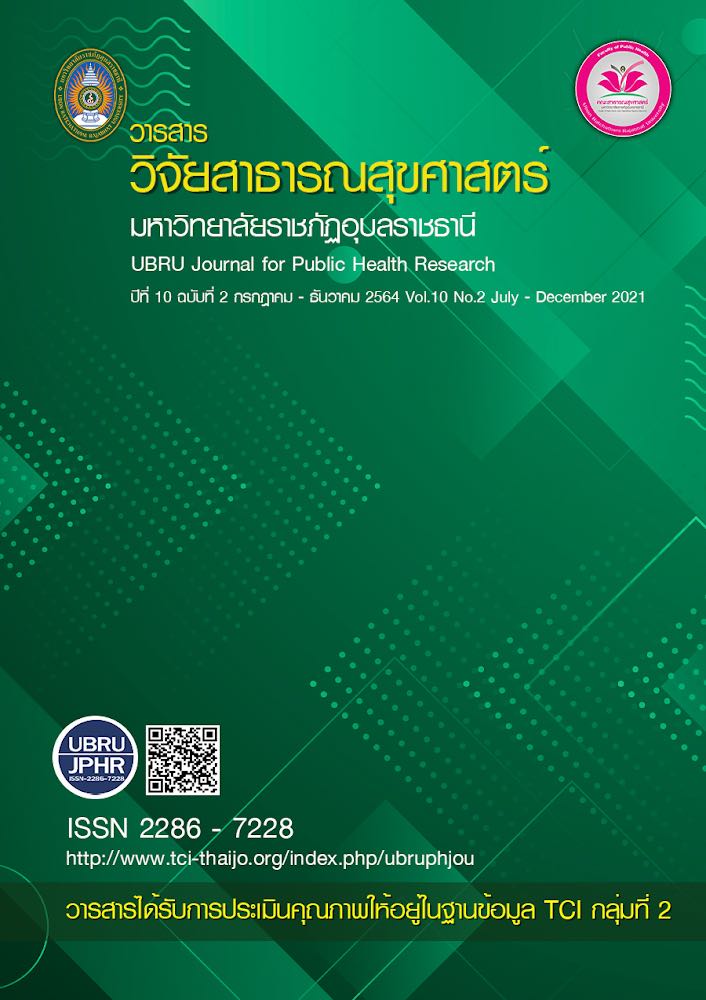Factors associated with junk food consumption among Department of Community Health students in University in the Northern
Keywords:
Junk food, students, eating habitsAbstract
The survey research to study factors related to the consumption habits of the community health students. University of northern Thailand a sample of 270 people, stratified random sampling, collected data using questionnaires. Analyze data with descriptive statistics, percentage (percentage) statistical using Chi-square Test.
The results showed that the sample was female 74.4% , Age 20 years 27.8%, the second year 26.3%, normal BMI 62.2%, Family income 15,001 Bath more 91.1%, Student income over 5,000 Baht/month 58.9%, no disease 93.0%, domiciled in the North 52.6%, Knowledge, Attitude, Low Dietary Intake 94.8% and 92.6%, relationship analysis showed that age, family income, attitude, factors contributing to the hostel, housing contributing factors, auxiliary factors, member supplement factors. and additional media inputs. Statistically significant consumption of food at p-value ≤ 0.05 gender, year class studied, BMI, student income, disease domicile, general knowledge of the consumption of food, environmental contributing factors and group supplementary factors. No relationship
In summary, the students had moderate food consumption behavior., with age, family income, attitude, factors contributing to the dormitory, housing contributing factors, supplementary factors, member supplement factors. and additional media inputs. It is associated with the consumption of food. Family, role in promoting knowledge in the consumption of the student's junction food.
References
จิราภรณ์ เรืองยิ่ง ,สุจิตรา จรจิตร ,กานดา จันทร์แย้ม. (2559). พฤติกรรมการบริโภคอาหารของวัยรุ่นในจังหวัดสงขลา:การสังเคราะห์องค์ความรู้และปัจจัยที่มีอิทธิพลต่อพฤติกรรมการบริโภคอาหาร. วารสารศิลปศาสตร์ มหาวิทยาลัยสงขลานครินทร์ วิทยาเขตหาดใหญ่, 8(1), 246-264.
ชนัญญา พรศักดิ์วัฒน์. (2560). พฤติกรรมการบริโภคอาหารเพื่อสุขภาพรูปแบบอาหารคลีน(Clean Food)กลุ่มวัยทำงานในเขตกรุงเทพมหานคร. วิทยานิพนธ์ปริญญามหาบัณฑิต สาขาวิชาเศรษฐศาสตร์ธุรกิจ มหาวิทยาลัยหอการค้าไทย.
นัชชา ยันติ ,อภิญญา อุตระชัย และกริช เรืองชัย. (2563). พฤติกรรมการบริโภคอาหารและปัจจัยที่มีความสัมพันธ์ต่อภาวะน้ำหนักเกินในนักศึกษา
มหาวิทยาลัยราชภัฏวไลยอลงกรณ์ ในพระบรมราชูปถัมภ์.คณะสาธารณสุขศาสตร์ มหาวิทยาลัยราชภัฏวไลยอลงกรณ์ ในพระบรมราชูปถัมภ์, 27-29.
ปวีณภัทร นิธิตันติวัฒน์และวรางคณา อุดมทรัพย์.(2560). พฤติกรรมการบริโภคอาหารของวัยรุ่นไทย ผลกระทบและแนวทางแก้ไข. วารสารวิทยาลัยพยาบาลพระปกเกล้า จันทบุรี. 28(1),122-128.
วิไลวรรณ คงกิจ. (2558). พฤติกรรมการบริโภคอาหารจานด่วนของเด็กวัยรุ่นในกรุงเทพมหานคร. วิทยานิพนธ์ปริญญามหาบัณฑิต สาขาวิชาสุขศึกษา มหาวิทยาลัยศรีนครินทรวิโรฒ.
สุวรรณา เชียงขุนทด. (2557). ความรู้และพฤติกรรมการบริโภคอาหารของคนภาษีเจริญ. สำนักงานกองทุนสนับสนุนการสร้างเสริมสุขภาพ (สสส.).
สํานักงานสถิติแห่งชาติ. (2561). การสำรวจพฤติกรรมการบริโภคอาหารของประชากร พ.ศ. 2560. กองสถิติพยากรณ์สำนักงานสถิติแห่งชาติ, 7-9.
อิสรียา พรหมมาและชัยนันท์ เหมือนเพ็ชร. (2557). ปัจจัยที่มีผลต่อพฤติกรรมการบริโภคอาหารตามสุขบัญญัติแห่งชาติของนักเรียนโรงเรียนวัดศิริจันทราราม จังหวัดปทุมธานี. การประชุมวิชาการ การพัฒนาชนบทที่ยั่งยืน ครั้งที่ 4 ประจำปี 2557
Bhanu Poudel , Sariyamon Tiraphat และ Seo Ah Hong. (2561).ปัจจัยที่มีผลต่อการบริโภคอาหารขยะของกลุ่มนักเรียนเขตเมือง ในอำเภอ
กาฐมาณฑุ ประเทศเนปาล. วารสารสาธารณสุขและการพัฒนา,16(2),29-72.
Yamane Taro. (1973). Statistic: An Introductory Analysis. 3rd ed. New York: Harper and Row.
Downloads
Published
How to Cite
Issue
Section
License
เนื้อหาและข้อมูลในบทความที่ลงตีพิมพ์ในวารสารวารสารวิจัยสาธารณสุขศาสตร์ มหาวิทยาลัยราชภัฏอุบลราชธานี ถือเป็นข้อคิดเห็นและความรับผิดชอบของผู้เขียนบทความโดยตรงซึ่งกองบรรณาธิการวารสาร ไม่จำเป็นต้องเห็นด้วย หรือร่วมรับผิดชอบใดๆ
บทความ ข้อมูล เนื้อหา รูปภาพ ฯลฯ ที่ได้รับการตีพิมพ์ในวารสารนี้ ถือเป็นลิขสิทธิ์ของวารสารฯ หากบุคคลหรือหน่วยงานใดต้องการนำทั้งหมดหรือส่วนหนึ่งส่วนใดไปเผยแพร่ต่อหรือเพื่อกระทำการใดๆ จะต้องได้รับอนุญาตเป็นลายลักอักษรณ์จากบรรณาธิการวารสารนี้ก่อนเท่านั้น


